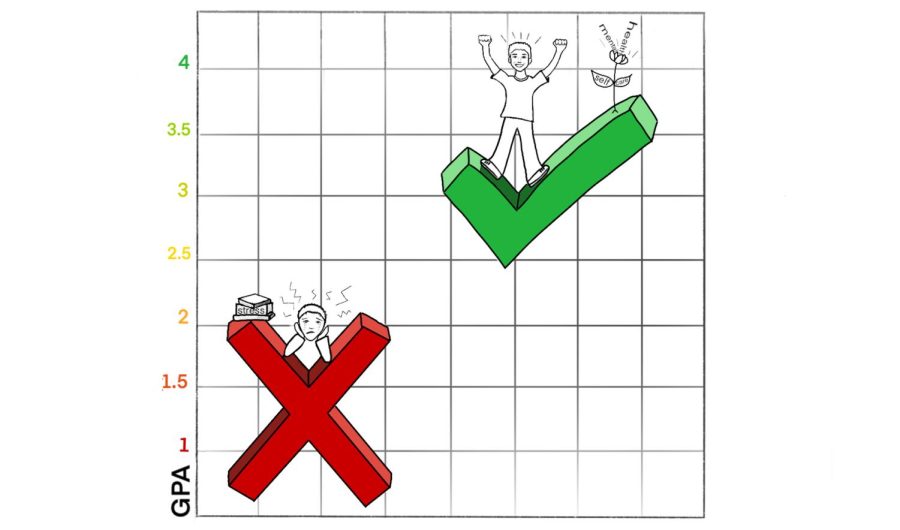It’s not all about that GPA
Students navigate stressful factor on college applications
Available on Naviance, admissions Scattergrams offer McCallum students a resource to compare their GPA and standardized test scores with those of other students previously accepted or denied to universities—red X’s indicating denials, and green check marks, acceptances. The Scattergrams are coupled with a scale indicating where one’s GPA falls among the national average for each school, providing another basis for admissions comparison. “Depending on the school it’s either very disheartening or a confidence boost,” senior Braeden Roeder said. “It’s an added layer of stress for sure.”
March 23, 2022
Grade point average is one of the most pressing concerns for high school students. While some students first become concerned about their GPA early in their high school lives, others don’t consider it a principal worry until their senior year begins and they confront the college- admissions process.
For sophomore Lucy Kuhn, her GPA has always been in the back of her mind.
“I check my GPA almost once a week, even though I know it doesn’t change,” Kuhn said. “I feel like it’s so heavily weighted for college; it’s just so much pressure to think that one grade down could ruin your college chances.”
Grade-induced stress levels vary depending on the student. Some wait to think about their GPA until their senior year while others have a concrete plan and goals set by the time they begin high school or even earlier.
While college can seem far away, college counselor Claire Nix says it is important to focus on getting good grades throughout high school, since GPA is an accumulated average.
“The sooner you accumulate credits, the harder it is to shift your GPA,” Nix said. “A lot of students are young, and they don’t realize the impact of getting a C in a course and how much ground you have to gain to move your GPA up after you have gained a certain amount of credits.”
Because some middle schools allow students to take courses for high school credit, even some middle school students stress about their grade point averages. Some may not understand enough about GPA to realize how damaging low grades can be or that their low scores could follow them until they graduate.
Freshman Greta Wayman took several high school-credit courses at Lamar, such as art, Algebra 1, geometry and her foreign-language credit. Wayman prioritized those courses.
“I feel like I focused more on those classes,” Wayman said. “I did know that they went into my GPA at the time and that they were for high school credits.”
While a grade-point average is certainly a contributing factor in helping a student gain college admission, counselor Daniela Romero commonly reassures students that their GPA is not the only factor that determines an applicant’s college acceptance.
“We see students worried about their GPA all the time,” Romero said. “A lot of times, they are worried about college. It’s a normal fear. What we always remind them is that there is more to [college admissions] than GPA. They also look into if you’re a really good test taker, if you have good scores on your SAT, ACT. They look at your transcript, and they just see what you’re involved with, academically and extracurriculars. They look at a lot of other things beyond GPA, but a lot of students think that if their GPA isn’t on a certain level, then they’re done, which is not true.” While the numerical average is important, it is not the only factor that colleges view when evaluating a student’s transcript. Colleges also look at the variety of courses a student excels in and the amount of rigor a student handles well. Nix says that doesn’t mean a student should take AP everything.
“If you’re taking all AP classes and you aren’t doing well in them, that’s not your best rigor,” Nix said. “If you’re taking two AP classes and other electives, and you’re doing well in all of those, then that is the highest amount of rigor you can handle.”
The level of classes you can take and thrive in is different for each student. Social factors and mental health can also become priorities when considering what classes to sign up for.
“I think students need to focus on a lineup of courses that best showcases success,” Nix said. “Whatever that means for each student, I think, is different, but you have to keep a lot of factors in mind. Where you want to go matters, how you are able to perform in courses matters, but mental health matters too, so finding a balance where you can be in the most rigorous schedule you can handle while doing well and trying to be health-minded are things to think about.”
Nix explains that at first students set goals for themselves that they may later find can be unattainable. Students should only take courses that they can manage, so they can adapt to the rigor they choose.
“As students get older and they see that the work is a lot, they get to know themselves more, and they know the level that they can handle among all the things they are doing in and out of McCallum,” Romero said. “If they need to drop those classes, they do, and they realize sometimes it’s better to drop down to a regular class if it keeps you mentally healthy.”
For senior Braeden Price, maximizing GPA took some analysis and planning. Since AP courses are weighted higher than his football elective was, Price opted to take football as a pass/fail class, so he could prevent the class from bringing down his GPA. A majority of classes can be taken on a pass/fail basis by request.
Navigating the GPA system can be extremely complicated for younger students. Most schools calculate GPA using weighted and unweighted averages on 4.0 and 5.0 scales. Flaws in the system or the use of different systems may also create confusion.
Senior Anna Bausman believes that there is a lack of communication about how GPA works. “I think they need to work on being more upfront and giving us more clear information on how it works,” Bausman said. Colleges primarily look at weighted GPA, and occasionally unweighted. According to Romero, there is often misunderstanding when it comes to how colleges calculate GPA.
“It can be kind of confusing a lot of the time,” she said. “What we usually tell kids is that colleges tend to look at that weighted GPA unless they specifically ask for the unweighted.”
While the need to earn high grades puts pressure on students all over the country, understanding your own level of rigor and advancement is key to moving forward toward success and a healthy mind.







